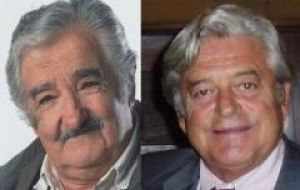MercoPress. South Atlantic News Agency
Uruguay’s economic policy and Mercosur links set to change predicts Moody’s
 Mujica and Lacalle have different approaches regarding Mercosur
Mujica and Lacalle have different approaches regarding Mercosur The risk-rating agency Moody’s Economy anticipates that whoever wins in Uruguay’s October presidential election, the only certainty is that “there will be changes in economic policy” and in regional inter-action, including a review of Mercosur relations.
Based on the proposals of the two leading candidates, Jose Mujica for the ruling coalition and Luis Alberto Lacalle, from the main opposition party, Uruguay could face “a more populist approach”, on the line of neighbouring Argentina and the Kirchner couple administrations, or a more market oriented stimulus, including more bilateral trade agreements, similar to what Chile has been practicing since 1990.
“The two main political parties programs have very different economic policies proposals and they will necessarily affect key areas, including fiscal conditions”, says Moody’s.
If Mujica is the next president, “more populist policies can be expected; a greater role for the government in the economy, something similar to what has happened in Argentina with the Kirchners and the budget deficit could soar over 3% of GDP pushed by “social” spending”.
Former president Lacalle on the other hand is expected to be more cautious with budget deficits; will favour a greater opening of the Uruguayan economy and less intervention from the government, closer to the more pragmatic and orthodox Chilean approach.
Lacalle and his ticket companion Jorge Larrañaga are currently on a three-day visit to Chile.
Regarding the ruling coalition’s promise to lower VAT by two points (to 21%) Moody’s warns that although it could help the lower income bracket, it would be harmful for the Treasury since VAT is the most significant revenue generating tax.
Moody’s anticipates that Mujica’s more regional approach, emphasizing links with Mercosur, would have an impact on local banks where many rich funds from Argentina and Brazil take refuge.
“Uruguayan banks operate under strict privacy laws, which combined with the country economic and political stability, makes it attractive and interesting for Argentines and Brazilians to hide their money. And even when Mujica’s promise of more banking transparency, some funds could leave the country”.
In an interview last March, Mujica said that Uruguayan banks’ secret accounts system had “accomplished its target”, but now they cause “more problems than benefits”, and it’s time to negotiate with the region its elimination in exchange for some advantages to Uruguay.
The reaction was immediate and mainly from his primary rival, and current ticket companion former Economy minister Danilo Astori who accused Mujica of not being “serious or coherent” (almost ignorant in banking affairs) and of becoming a “lethal danger” with his “obscurantist attitudes”.
Lacalle’s program in contrast, according to Moody’s, is more acceptable for the market economy: lesser taxes on personal income and companies benefits; balanced budgets and a radical change regarding Mercosur.
The main opposition party candidate would like to see Uruguay become an associate partner of Mercosur, like Chile, instead of a full member. This is expected to cause irritation and a possible rift with Brazil and Argentina, but would open the door for trade agreements with other countries and other areas.
Moody’s predicts Lacalle would leave the banking system unchanged and would try to renegotiate several bills, passed under the current administration, too inclined towards employees and unions, which could have an impact on labour hiring.
Finally Moody’s Economy makes a forecast in the event of a run-off a month later, in November. Although Mujica leads in public opinion preference he is still short of the 50% plus one needed in October, and in a run off Lacalle would garner the support from the Colorado party. Besides, according to Moody’s, Mr. Mujica belongs to the “hard left” of the ruling coalition and is “a polarizing figure which could scare some of the undecided voters who tend to be moderates”.
However an additional comment could be added to Moody’s Economy report and predictions. The ruling coalition in 2004 did not need a run off and therefore had a clear majority in Parliament to approve its legislative initiatives.
Whoever wins this time, and all public opinion polls agree on this, will be victorious in November, which means a specific understanding on certain bills will have to be reached before going to parliament, or some sort of coalition will be needed to support Executive initiatives, thus significantly limiting presidential candidates’ proposals. This did not happen with President Tabare Vazquez administration.
Middle of the road Uruguay, after five years of a “new experience”, seems ready to return to its old track unless Mr. Mujica can convince the electorate, beyond any doubts, that he is effectively that option.




Top Comments
Disclaimer & comment rulesCommenting for this story is now closed.
If you have a Facebook account, become a fan and comment on our Facebook Page!